by Silas Weir Mitchell | Supplementary/Story - A Dilemma | 10th English: UNIT 7 : Supplementary/Story: A Dilemma
Chapter: 10th English: UNIT 7 : Supplementary/Story: A Dilemma
A Dilemma
Supplementary
A Dilemma
Silas Weir Mitchell
I was just thirty-seven when my Uncle Philip died. A week before
that event he sent for me; and here let me say that I had never set eyes on
him. He hated my mother, but I do not know why. She told me long before his
last illness that I need expect nothing from my father’s brother. He was an
inventor, an able and ingenious mechanical engineer, and had much money by his improvement in turbine-wheels.
He was a bachelor; lived alone, cooked his own meals, and collected precious
stones, especially rubies and pearls. From the time he made his first money he
had this mania. As he grew richer, the
desire to possess rare and costly gems became stronger. When he bought a new
stone, he carried it in his pocket for a month and now and then took it out and
looked at it. Then it was added to the collection in his safe at the trust
company.
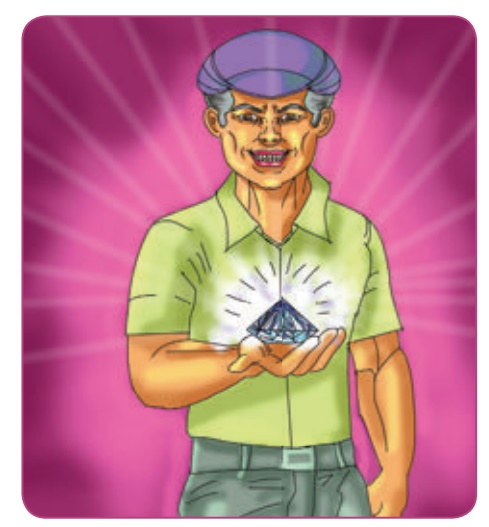
At the time he sent for me I was a clerk, and poor enough.
Remembering my mother’s words, his message gave me, his sole relative, no new
hopes; but I thought it best to go.
When I sat down by his bedside, he began, with a maliciouss grin:
“I suppose you think me queer. I will explain.” What he said was certainly
queer enough. “I have been living on an annuity into which I put my fortune. In
other words, I have been, as to money, concentric half of my life to enable me
to be as eccentric as I pleased the rest of it. Now I repent of my wickedness
to you all, and desire to live in the memory of at least one of my family. You
think I am poor and have only my annuity. You will be profitably surprised. I
have never parted with my precious stones; they will be yours. You are my sole
heir. I shall carry with me to the other world the satisfaction of making one
man happy.
“No doubt you have always had expectations, and I desire that you
should continue to expect. My jewels are in my safe. There is nothing else
left”.
When I thanked him he grinned all over his lean face, and said:
“You will have to pay for my funeral.”
I must say that I never looked forward to any expenditure with
more pleasure than to what it would cost me to put him away in the earth. As I
rose to go, he said:
“The rubies are valuable. They are in my safe at the trust
company. Before you unlock the box, be very careful to read a letter which lies
on top of it; and be sure not to shake the box.” I thought this odd. “Don’t
come back. It won’t hasten things.”
He died that day next week, and was handsomely buried. The day
after, his will was found, leaving me his heir. I opened his safe and found in
it nothing but an iron box, evidently of his own making, for he was a skilled
workman and very ingenious. The box was heavy and strong, about ten inches
long, eight inches wide and ten inches high.
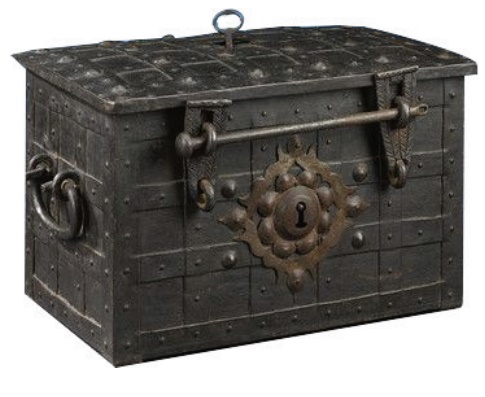
On it lay a letter to me. It ran thus:
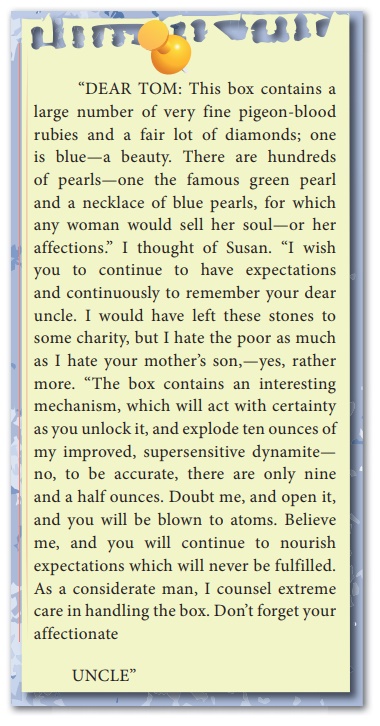
I stood appalled, the key in my hand. Was it true? Was it a lie? I had spent all
my savings on the funeral, and was poorer than ever.
Remembering the old man’s oddity, his malice, his cleverness in mechanic arts,
and the patent explosive which had helped to make him rich, I began to feel how
very likely it was that he had told the truth in this cruel letter.
I carried the iron box away to my lodgings, set it down with care
in a closet, laid the key on it, and locked the closet.
Then I sat down, as yet hopeful, and began to exert my ingenuity
upon ways of opening the box without being killed. There must be a way.
After a week of vain thinking I bethought me, one day, that it
would be easy to explode the box by unlocking it at a safe distance, and I
arranged a plan with wires, which seemed as if it would answer. But when I
reflected on what would happen when the dynamite scattered the rubies, I knew
that I should be none the richer. For hours at a time I sat looking at that box
and handling the key.
At last I hung the key on my watch-guard; but then it occurred to
me that it might be lost or stolen. Dreading this, I hid it, fearful that
someone might use it to open the box. This state of doubt and fear lasted for
weeks, until I became nervous and began to dread that some accident might
happen to that box. A burglar might come and boldly carry it away and force it
open and find it was a wicked fraud of my uncle’s. Even the rumble and
vibration caused by the heavy vans in the street became at last a terror.
Worst of all, my salary was reduced, and I saw that marriage was
out of the question.
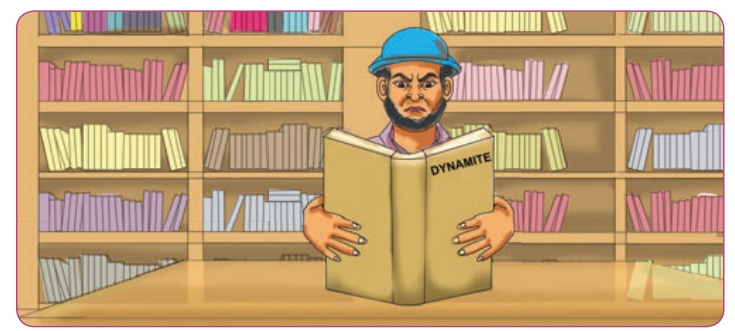
In my despair I consulted Professor Clinch about my dilemma, and
as to some safe way of getting at the rubies. He said that, if my uncle had not
lied, there was none that would not ruin the stones, especially the pearls, but
that it was a silly tale and altogether incredible. I offered him the biggest ruby if he wished to
test his opinion. He did not desire to do so.
Dr. Schaff, my uncle’s doctor, believed the old man’s letter, and
added a caution, which was entirely useless, for by this time I was afraid to
be in the room with that terrible box.
At last the doctor kindly warned me that I was in danger of losing
my mind with too much thought about my rubies. In fact, I did nothing else but contrive wild plans to get at
them safely. I spent all my spare hours at one of the great libraries reading
about dynamite.
Indeed, I talked of it until the library attendants, believing me
a lunatic or a dynamite fiend, declined to humor me, and spoke to the police. I
suspect that for a while I was “shadowed” as a suspicious, and possibly
criminal, character. I gave up the libraries, and, becoming more and more
fearful, set my precious box on a down pillow, for fear of its being shaken;
for at this time even the absurd possibility of its being disturbed by an
earthquake troubled me. I tried to calculate the amount of shake needed to
explode my box.
The old doctor, when I saw him again, begged me to give up all
thought of the matter, and, as I felt how completely I was the slave of one despotic idea, I tried to take
the good advice thus given me.
Unhappily, I found, soon after, between the leaves of my uncle’s
Bible, a numbered list of the stones with their cost and much beside. It was
dated two years before my uncle’s death. Many of the stones were well known,
and their enormous value amazed me.
Several of the rubies were described with care, and curious
histories of them were given in detail. One was said to be the famous “Sunset
ruby,” which had belonged to the Empress-Queen Maria Theresa. One was called
the “Blood ruby,” not, as was explained, because of the color, but on account
of the murders it had occasioned. Now, as I read, it seemed again to threaten
death.
The pearls were described with care as an unequalled collection.
Concerning two of them my uncle had written what I might call biographies—for,
indeed, they seemed to have done much evil and some good. One, a black pearl,
was mentioned in an old bill of sale as—She—which seemed queer to me.
It was maddening. Here, guarded by a vision of sudden death, was
wealth “beyond the dreams of avarice.” I am not a clever or ingenious man; I know little beyond how to
keep a ledger, and so I was, and am, no doubt, absurd about many of my notions
as to how to solve this riddle.
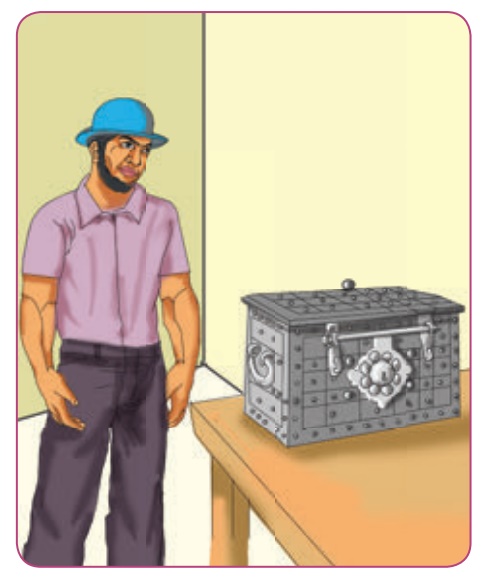
At one time I thought of finding a man who would take the risk of
unlocking the box, but what right had I to subject anyone else to the trial I
dared not face? I could easily drop the box from a height somewhere, and if it
did not explode could then safely unlock it; but if it did blow up when it
fell, good-by to my rubies. Mine, indeed! I was rich, and I was not. I grew
thin and morbid, and so miserable that, I at last carried my troubles to my
father confessor. He thought it simply a cruel jest of my uncle’s, but
was not so eager for another world as to be willing to open my box.
He, too, counselled me to cease thinking about it. Good heavens! I
dreamed about it. Not to think about it was impossible. Neither my own thought
nor science nor religion had been able to assist me.
Two years have gone by, and I am one of the richest men in the
city, and have no more money than will keep me alive.
Susan said I was half cracked like Uncle Philip, and broke off her
engagement. In my despair I advertised in the Journal of Science, and have had
absurd schemes sent me by the dozen. At last, as I talked too much about it,
the thing became so well known that when I put the horror in a safe, in a bank,
I was promptly desired to withdraw it. I was in constant fear of burglars, and
my landlady gave me notice to leave, because no one would stay in the house
with that box. I am now advised to print my story and await advice from the
ingenuity of the American mind.
I have moved into the suburbs and hidden the box and changed my name
and my occupation. This I did to escape the curiosity of the reporters. I ought
to say that when the government officials came to hear of my inheritance, they
were reasonably desired to collect the succession tax on my uncle’s estate.
I was delighted to assist them. I told the collector my story, and
showed him Uncle Philip’s letter. Then I offered him the key, and asked for
time to get half a mile away. That man said he would think it over and come
back later.
This is all I have to say. I have made a will and left my rubies
and pearls to the Society for the Preservation of Human Vivisection. If any man thinks this
account a joke or an invention,
let him coldly imagine the situation:
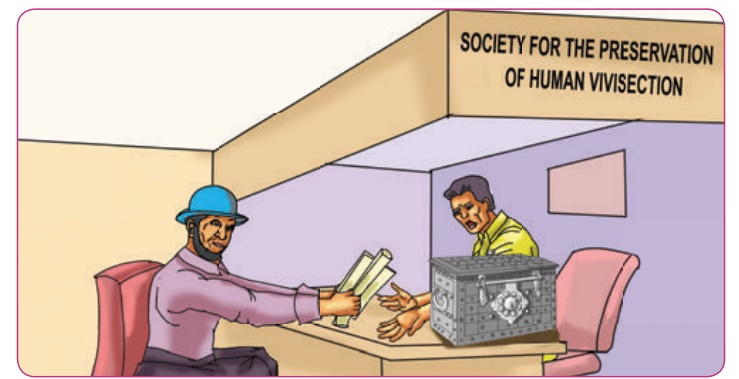
Given an iron box, known to contain wealth, and to contain
dynamite, arranged to explode when the key is used to unlock it – what would
any sane man do? What would he advise?
About the author:
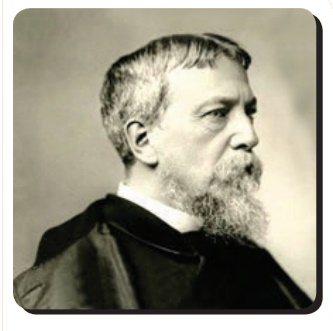
Silas Weir Mitchell (1829-1914) was a
neurologist by profession. He was among the famous physicians of his time and a
prolific writer of both scientific and literary works. He was born in
Philadelphia, studied at the University of Pennsylvania and received the degree
of M.D. in 1850. He is considered the father of neurology as well as a pioneer
in scientific medicine. He published more than 25 literary titles and his
medical experiences and background enabled him to write historical fiction with
much psychological insight. Many honorary degrees were conferred upon him by
several Universities at home and abroad. The American Academy of Neurology
award for young researchers is named after him.
Related Topics